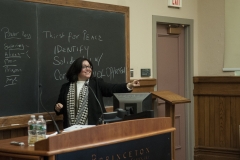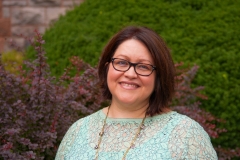This article is from the Spring 2017 issue of Mission Crossroads magazine, which is printed and mailed free to subscribers’ homes three times a year by Presbyterian World Mission.
——————
My story of mission as a woman of Latina-Hispanic heritage
April 9, 2017
My call to mission is the result of mission work, mission schools, theological education and the rooting of the Protestant Reformation in Latin America where, since the 15th century, the largest numbers of historically and culturally Roman Catholics have lived. Ours is a religiously pluralistic region where popular religions—and now the fastest growing “nondenominational” Christian movements in the world—coexist with leading theologies of the future and with Christian theologies many centuries old.
As a fourth-generation Protestant of the historic churches—uncommon in Latin America—I wonder if “mission in reverse” from the global south to the global north is something that needs to happen more often?
As a person of Latina/Hispanic mixed heritage, I view my transnational identity as a gift and a challenge to the Presbyterian Church. After all, persons like myself represent a growing population in the United States.
By 2050 the church—as well as the population in the U.S.—will reflect society, regardless of how difficult it may be for a majority white denomination to change. It seems inevitable that the church will require mixed-heritage members in mission service to the church itself. I find that not only my Latina heritage but also my mix of family cultures give me a different perspective and insight into our Trinitarian God and our global church.
For two years I was co-moderator of the special committee studying the Confession of Belhar, as commissioned by the General Assembly of the PC(USA). In June 2016, after many years of struggling with the Confession of Belhar, the commissioners voted (540-33) to approve this South African confession as our own. Belhar recognizes racial segregation as sin and rings true to my experience as a person of mixed racial ethnic heritage, both Latin American and Latinx-American, whose children are a further mix of who I, and their African-American father, are. Theologically Belhar proclaims unity, reconciliation and justice, which makes sense as Reformed, decolonizing theology.
The work of mission has helped to spread and plant the seeds of the Reformed tradition in many places like South Africa and Venezuela. But it is justice that makes the work of the family of God possible.
My life story does not begin in mission, but perhaps it is because of mission that my life has a particular transformational message for our life together as a national and global church.
I was born in Maracaibo, Venezuela, into a household of global theologians. In 2011, I gave a talk at the Biblical University of Costa Rica, where the excited librarian found records and photographs belonging to past students who just happened to be my grandparents. In the early 20th century, my paternal grandparents came from Venezuela and Guatemala to Costa Rica to study theology. My grandfather was trained as a pastor and my grandmother as a Christian educator. Their parents had converted to Christianity a generation earlier, and this Protestant rooting took shape through theological education. My father had been aided by Presbyterian missionaries in Venezuela so he could attend a Presbyterian college in the U.S., since the Venezuelan university he had planned to attend had been closed by the government.
On the other side of my family, my maternal grandfather in Pennsylvania was an ordained Presbyterian elder, and my mother grew up in a Protestant family with a Protestant worldview. Hers was a poor farming family, and Presbyterian pastors helped my mother financially to attend a Presbyterian college and later, a Presbyterian seminary.
My parents met and married in college and attended seminary together to prepare for a life of ministry and mission. The month of my birth, my father, a Venezuelan national, was ordained as a national pastor of the Presbyterian Church of Venezuela, his first pastorate. My mother, a U.S. national, waited more than 30 years after receiving her Master of Divinity degree before being ordained and sent into the mission field in Latin America, where she had moved in 1965.
My mother was a theological educator in Colombia and Venezuela, and later in Spain. My father served the PC(USA) in Colombia in the late ’90s as an educator and rector of a seminary, which at that time was shared by Presbyterians of Colombia, Venezuela and Ecuador. My parents’ official mission work continued in Spain, where for seven years both taught at the Evangelical United Theological Seminary on the outskirts of Madrid.
When I was a teen our family lived in the U.S. for the first time while my parents diddoctoral studies. I learned about Southern and Northern Presbyterianism, and the history of prophetic, post-segregation ministry in the U.S. My mentors were pastors who led protests and gave prophetic sermons, and a Mexican-American Presbyterian leader who guided me into leadership and mission.
Through the predecessor of the Presbyterian Mission Agency’s Young Adult Volunteer program, my spouse and I were Diaconal workers in Colombia and Venezuela in the early ’90s. Much of the mission happened after I was an adult, but my birth story, childhood, and mixed heritage identity were shaped by mission and ministry as well.
My story of how mission shaped my life and that of my family and church is a story of transformation. If mission has led me to a journey of transformation, transformation itself has been my journey. In God’s family there is no hierarchy of power based on culture or country. We are all one in Christ, sent to be in relationship with people—all people.
Matilde Moros, theologian and professor, Humanities Department, Virginia Commonwealth University, Richmond, Virginia
Today’s Focus: Matilde Moros, theologian and professor, Humanities Department, Virginia Commonwealth University
Let us join in prayer for:
PC(USA) Mission Co-workers
Bernard Adeney-Risakotta, Indonesia
Farsijana Adeney-Risakotta, Indonesia
PC(USA) Agencies’ Staff
Deborah Bernard, BOP
Shawn Berry, FDN
Let us pray:
Lord Jesus, redeemer and transformer of the world, we ask that you release us from all the old slaveries of our grave sins of exclusion, egotism, intolerance, and lack of commitment to your justice. Amen.
Revised Common Lectionary Readings for Sunday, April 9, 2017, Palm Sunday (Passion Sunday) (Year A)
Liturgy of the Palms Readings:
Psalm 118:1-2, 19-29
Reading Matthew 21:1-1
Liturgy of the Passion Readings:
First Reading Isaiah 50:4-9a
Psalm 31:9-16
Second Reading Philippians 2:5-11
Gospel Matthew 26:14-27:66
Or alternate Gospel Matthew 27:11-54
![]() You may freely reuse and distribute this article in its entirety for non-commercial purposes in any medium. Please include author attribution, photography credits, and a link to the original article. This work is licensed under a Creative Commons Attribution-NonCommercial-NoDeratives 4.0 International License.
You may freely reuse and distribute this article in its entirety for non-commercial purposes in any medium. Please include author attribution, photography credits, and a link to the original article. This work is licensed under a Creative Commons Attribution-NonCommercial-NoDeratives 4.0 International License.

